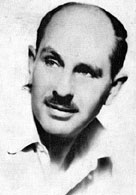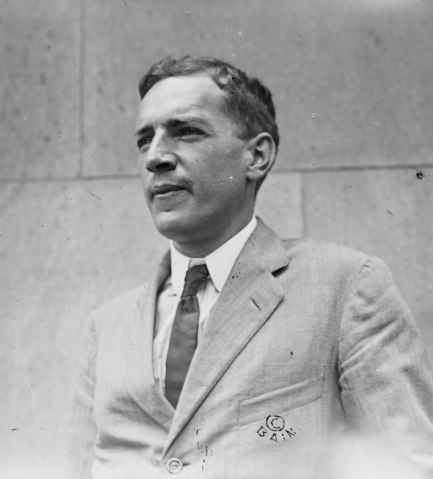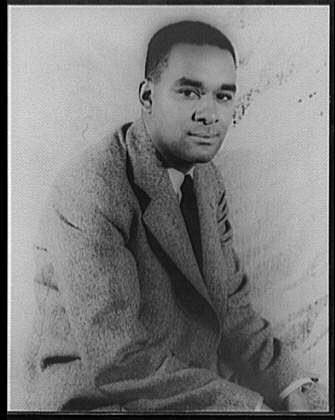
David M. Halperin
Born: 1952 in Chicago, Illinois
Pen Name: None Connection to Illinois: Halperin was born in Chicago. Biography: David M. Halperin is a theorist in the fields of gender studies, queer theory, critical theory, material culture and visual culture. He is the cofounder of ''GLQ: A Journal of Lesbian and Gay Studies''.Currently, he is the WH Auden Distinguished University Professor of the History and Theory of Sexuality at the University of Michigan. His primary interests are the history and theory of homosexuality; classical studies and its relation to contemporary cultural history; gay men's cultural practices and subjectivity and HIV/AIDS. Along with the books he has written, he has also edited ''The Construction of Erotic Experience in the Ancient Greek World'' with John J. Winkler and Froma I. Zeitlin (1990), ''The Lesbian and Gay Studies Reader'' with Henry Abelove and Michele Aina Barale (1993), ''Gay Shame'' with Valerie Traub (2009) and ''The War on Sex'' with Trevor Hoppe which is forthcoming.
Awards:
- '''''The Lesbian and Gay Studies Reader'''''
- -- Lambda Literary Award for Anthologies
Website: http://www.lsa.umich.edu/english/people/profile.asp?ID=254
David M. Halperin on WorldCat : http://www.worldcat.org/search?q=david+m.++halperin
Selected Titles
| Before pastoral, Theocritus and the ancient tradition of bucolic poetry / ISBN: 0300025823 OCLC: 8589950 Yale University Press, New Haven : ©1983. |
|
| How to be gay / ISBN: 0674283996 OCLC: 807789456 "No one raises an eyebrow if you suggest that a guy who arranges his furniture just so, likes techno music or show tunes, and knows all of Bette Davis's best lines by heart might, just possibly, be gay. But if you assert that male homosexuality is a cultural practice, expressive of a unique subjectivity and a distinctive relation to mainstream society, people will protest. This, they will say, is just a stereotype. David Halperin, a pioneer of LGBTQ studies, dares to suggest that gayness is a specific way of being that gay men must learn from one another in order to become who they are. Carrying forward the notorious undergraduate course of the same title that he taught at the University of Michigan, provoking cries of outrage from both the right-wing media and the gay press, Halperin concludes that the genius of gay culture resides in some of its most despised features: its aestheticism, snobbery, melodrama, adoration of glamour, caricatures of women, and obsession with mothers. The insights and unfazed critical intelligence displayed by gay culture, Halperin argues, have much to offer the mainstream."--Provided by publisher. |
|
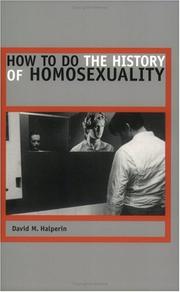 |
How to do the history of homosexuality / ISBN: 0226314480 OCLC: 48773850 |
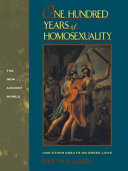 |
One hundred years of homosexuality : ISBN: 9781138140769 OCLC: 953424158 Taylor & Francis, [Place of publication not identified] : 2016. |
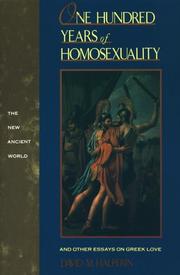 |
One hundred years of homosexuality : ISBN: 0415900972 OCLC: 19740359 Routledge, New York : 1990. Examining love, sex and gender in the ancient Greek world, the author documents the existence in ancient Greece of a radically unfamiliar set of attitudes and behaviours, institutions and social practices. |
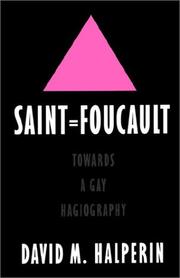 |
Saint Foucault : ISBN: 0195111273 OCLC: 31605139 Oxford University Press, New York : 1995. Although there is scarcely more than a passing mention of homosexuality in Michel Foucault's scholarly writing, he became, after dying of AIDS in 1984, a powerful source of both personal and political inspiration to an entire generation of gay activists. At the same time, he acquired mainstream detractors who have systematically distorted and misrepresented this intellectual figure. This book is a defense of Foucault. Despite his statement that his work "had nothing to do with gay liberation," the book portrays him as a galvanizing thinker whose career as a theorist and activist will continue to serve as a model for other gay intellectuals. |
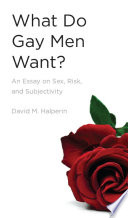 |
What do gay men want? : ISBN: 0472033654 OCLC: 128237053 University of Michigan Press, Ann Arbor : ©2007. Recent efforts to analyze gay men's motives for sexual risk-taking in the context of the HIV/AIDS epidemic have led to a revival of medical thinking about homosexuality and breathed new life into punitive cliches about gay men's alleged low self-esteem, lack of self-control and various psychological deficits. Against these insidious forms of sexual discipline, David Halperin champions neglected traditions of queer thought, both literary and popular, that afford possibilities for addressing the vexed question of what gay men want. Anyone searching for creative and non-judgmental ways to slow the spread of HIV/AIDS among gay men - or interested in new modes of thinking about gay male subjectivity - should read this book.--Jacket. |


